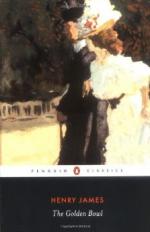“No, we’re not proud,” she answered after a moment. “I’m not sure that we’re quite proud enough.” Yet she changed the next instant that subject too. She could only do so, however, by harking back—as if it had been a fascination. She might have been wishing, under this renewed, this still more suggestive visitation, to keep him with her for remounting the stream of time and dipping again, for the softness of the water, into the contracted basin of the past. “We talked about it—we talked about it; you don’t remember so well as I. You too didn’t know— and it was beautiful of you; like Kitty and Dotty you too thought we had a position, and were surprised when I thought we ought to have told them we weren’t doing for them what they supposed. In fact,” Maggie pursued, “we’re not doing it now. We’re not, you see, really introducing them. I mean not to the people they want.”
“Then what do you call the people with whom they’re now having tea?”
It made her quite spring round. “That’s just what you asked me the other time—one of the days there was somebody. And I told you I didn’t call anybody anything.”
“I remember—that such people, the people we made so welcome, didn’t ‘count’; that Fanny Assingham knew they didn’t.” She had awakened, his daughter, the echo; and on the bench there, as before, he nodded his head amusedly, he kept nervously shaking his foot. “Yes, they were only good enough—the people who came— for us. I remember,” he said again: “that was the way it all happened.”
“That was the way—that was the way. And you asked me,” Maggie added, “if I didn’t think we ought to tell them. Tell Mrs. Rance, in particular, I mean, that we had been entertaining her up to then under false pretences.”
“Precisely—but you said she wouldn’t have understood.”
“To which you replied that in that case you were like her. You didn’t understand.”
“No, no—but I remember how, about our having, in our benighted innocence, no position, you quite crushed me with your explanation.”
“Well then,” said Maggie with every appearance of delight, “I’ll crush you again. I told you that you by yourself had one—there was no doubt of that. You were different from me—you had the same one you always had.”
“And then I asked you,” her father concurred, “why in that case you hadn’t the same.”
“Then indeed you did.” He had brought her face round to him before, and this held it, covering him with its kindled brightness, the result of the attested truth of their being able thus, in talk, to live again together. “What I replied was that I had lost my position by my marriage. That one—I know how I saw it—would never come back. I had done something to it—I didn’t quite know what; given it away, somehow, and yet not, as then appeared, really got my return. I had been assured—always by dear Fanny—that I could get it, only I must wake up. So I was trying, you see, to wake up—trying very hard.”




